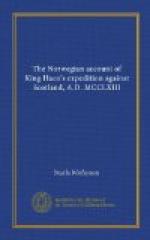While King Haco remained in the Orkneys the most part of his troops sailed to Norway; some went with the King’s permission, but others took leave for themselves. King Haco, on his arrival at the islands, had at first given out that he would return immediately to Norway; but, as it was a long time before the wind favoured him, he determined to winter in the Orkneys. He, therefore, named twenty ships that were to remain with him, and dismissed the rest. All the vassals stayed with him, except Eilif of Naustdale; he sailed home. Most of the gentry, however, continued with their Sovereign. The King then despatched letters to Norway, concerning the necessaries he should want. After All Saints Day, the King steered for Medalland[101] harbour; but spent one day at Ronaldsha.
On the Saturday before Martinmas King Haco rode to the port of Medalland, and after mass he was taken very ill. He was aboard his ship during the night; but, on the morning, he ordered mass to be sung on shore. He afterwards held a council to deliberate where the vessels should be laid up; and ordered his men to be attentive, and see after their respective ships. Upon this each captain took the charge of his own galley. Some were laid up in the harbour of Medalland, and others at Skalpeid.[102]
Next King Haco proceeded to Skalpeid, and then rode to Kirkwall. He, with such officers as dined at his table, lodged in the Bishop’s palace. Here the King and the Bishop kept separate tables in the halls, each for his own retinue; but the King dined in the upper story. He ordered certain districts to furnish his nobility and household with provisions. Andrew Plytt had the inspection of the King’s table, and delivered out to the courtiers, retainers, masters of the Lights, and other attendants their usual allowance. After the proper arrangements were taken concerning the disposal of the fleet, the different captains went whither their ships were laid up. The Barons who remained at Kirkwall were Briniolf Johnston, Erling Alfson, Ronald Urka, Erling of Birkey, John Drotning, and Erlend Red. The other Barons repaired to their proper districts.
King Haco had spent the summer in much watchfulness and anxiety. Being often called to deliberate with his captains, he had enjoyed little rest, and when he arrived at Kirkwall, he was confined to his bed by his disorder. Having lain for some nights, the illness abated, and he was on foot for three days. On the first day he walked about in his apartments; on the second, he attended at the Bishop’s chapel to hear mass; and on the third he went to Magnus’s Church, and walked round the shrine of St Magnus, Earl of Orkney. He then ordered a bath to be prepared, and got himself shaved. Some nights after he relapsed, and took again to his bed. During his sickness, he ordered the Bible and Latin authors to be read to him. But finding his spirits were too much fatigued by reflecting on what he had heard, he desired Norwegian books might be read to




